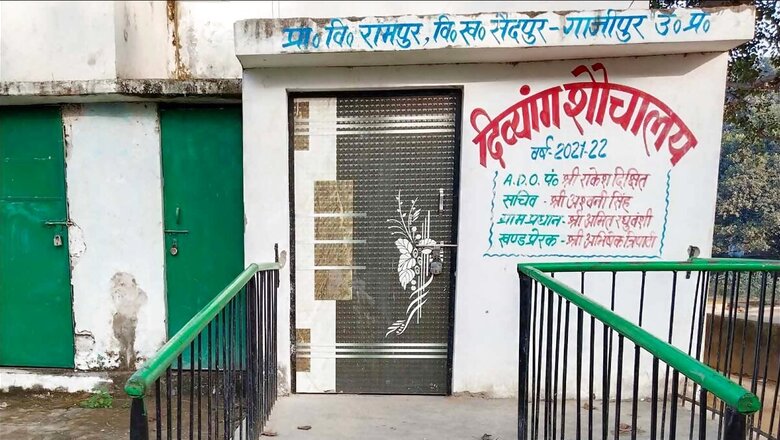
views
For those of us who live in cities, particularly those of us who live in apartment complexes and housing societies, the problems of sanitation feel a world away. We live in homes with toilets, employ cleaners, and have regular pickups for garbage. In essence, our sanitation ecosystem and our toilet habits and hygiene are already set. So why does a lack of sanitation facilities, or poor sanitation practices become our problem?
It starts at home.
In most urban families, the cleaning and maintenance of the toilet defaults to the hired help. Even educated families don’t understand the role of toilet hygiene in their family’s health. This is a gap that Harpic, India’s leading brand in the lavatory care segment, has tried to mend. Over the years, Harpic has built up a solid body of work with regards to communications about the ins and outs of toilet hygiene and the impact of a dirty toilet on specific diseases.
How it affects your family
Children:
Children are especially at risk of disease and infection when they live in unsanitary conditions. If you have a baby or a small child at home, you need to be extra alert about what pathogens are lurking in your toilet. Poor sanitation can cause diarrhoea, which is a leading cause of death among children under five years old. Diarrhoea is the third most common cause of death in under-five children, responsible for 13% deaths in this age-group, killing an estimated 300,000 children in India each year.
Vulnerable elders:
Vulnerable elders attract the same risks as little children and for the same reasons: weakened immune responses, and poor sanitation practices. For vulnerable elders, these problems are compounded by any chronic or long term health conditions they may already have. In addition, poor sanitation can increase their risk of falls and injuries, which can be particularly dangerous for older adults.
Differently abled people:
Toilets need to be accessible for everyone, including those of us who are differently abled. However, this continues to be a problem – most public toilets are cramped, and therefore difficult to access by wheelchair. Some may not even have ramps. A dirty toilet, or one that is poorly maintained compounds these problems. People with impaired vision, for instance, depend on consistency and when toilets are not properly stocked, or when toilets are damaged, this can create additional difficulties.
Women:
An unclean toilet poses particular threats to women. Women are more susceptible to get Urinary Tract Infections from dirty toilets than men, because a woman’s urethra (the tube from the bladder to where the urine comes out of the body) is shorter than a man’s. This makes it easier for bacteria to get into the bladder. Women have also been schooled to ‘hold it’, which can create unnecessary pressure on internal organs, making UTIs worse (and more painful) and also negatively impacting kidney function. Dirty toilets also expose women to all manner of infection during their menses – the ambient parasites (bacteria and viruses) make changing sanitary napkins in a dirty toilet fraught with negative possibilities.
Trans people:
Trans people face the same issues as women when it comes to safety and privacy. As acceptance is low, trans people are often on the receiving end of transphobic attacks. Toilets in India don’t cater to this group, creating difficulties and awkwardness at the best of times, and dangerous situations at the worst of times.
Men:
Men too, face the same problems as women, but to a much lesser degree. They too carry the risks for UTIs and kidney problems. However, this doesn’t mean that men can get away with bad toilet habits – their good toilet habits affect the whole family which shares the toilet with them!
How it affects your community
Maids who live in slums:
Maids who live in slums, for example, are at particular risk when sanitation is poor. Often, these women don’t have access to personal toilets and have to use communal ones where maintenance and upkeep is an issue. They face the same risks as those listed for women in the previous section, and further, are responsible for collecting water and managing household hygiene. When sanitation is poor, women may have to travel long distances to collect water, which can be dangerous and time-consuming. They may also be at greater risk of sexual harassment and assault when using public toilets or bathing facilities.
Building security guards:
Building security guards are another group that can be affected by poor toilet sanitation as many housing societies don’t give them their own toilet. These men often have to walk to nearby public toilets, which may or may not be clean and well-maintained. They may be responsible for cleaning public areas, such as restrooms or elevators, which can expose them to a variety of health risks. They may also bring the infections they’ve caught from public facilities into our communities and common spaces. Fortunately, the problem has a very simple solution: their own toilet, combined with a clearly communicated cleaning schedule.
Sanitation workers in your locality:
They are responsible for collecting and disposing of toilet and other wastes, which can be hazardous and expose workers to a variety of health risks. Without proper sanitation facilities and protective gear, sanitation workers are at risk of injury and infection. These infections are then carried home to their families and communities, a fact that often causes ostracisation for these workers. By insisting that your local municipality provide safe and healthy working conditions for sanitation workers, we can protect the health and well-being of all members of our communities, and restore dignity for these essential workers.
How it affects your city
Burden on hospitals:
Poor sanitation unleashes multipliers on water-borne diseases, vector borne diseases and neglected tropical diseases. In this way, our hospitals and public healthcare facilities are always busy fighting rising numbers of these cases, creating an avoidable burden. Good toilet sanitation practices can not only help halt the spread, but also ensure better outcomes when hospitalisation is needed, because the hospitals aren’t already overwhelmed with cases.
Readiness for outbreaks:
When toilet sanitation and habits are poor, infectious diseases can spread quickly and easily, putting entire populations at risk. This was evidenced during the COVID-19 pandemic, when proper sanitation practices were carried out and social distancing was practiced, we flattened the curve. By doing so, we enhanced the ability of our public health infrastructure in ensuring better outcomes for those severe cases who needed hospitalisation.
Tourism:
Clean and safe toilets and sanitation facilities are essential for attracting tourists and promoting economic growth. When cities have poor sanitation infrastructure or suffer from high levels of pollution, it can deter tourists and harm local businesses. Clean and well laid out cities, on the other hand, look more attractive to tourists.
How it affects your country
Productivity lost:
Poor sanitation, poor toilet habits and low hygeine can have a significant impact on productivity, as workers need to take time off due to illness or when caring for sick family members. According to the World Bank, poor sanitation costs the global economy $260 billion per year in lost productivity.
School days lost:
Poor sanitation, poor toilet habits and low hygeine cause illnesses which in turn cause absenteeism in schools and colleges, making it harder for students to catch back up. Hepatitis A, for instance, has a long recovery time and can make it very hard for students to catch back up with their class post recovery (which can take 3 months!). This can cause some students to drop out altogether.
Positive returns on investment:
Investing in clean toilets is not just a moral obligation; it’s also a smart investment. For every dollar invested in sanitation, there is a fourfold return in increased productivity and reduced healthcare costs. Economic benefits include an overall estimated gain of 1.5% of global GDP and a $4.3 return for every dollar invested in water and sanitation services due to reduced health care costs for individuals and society.
How it affects our mindsets
While access to toilets has greatly improved in India, the accompanying change in behaviour is yet to take root. Public toilets, be they at your local cinema, on flights or even the local Sulabh Sauchalaya, are considered to be *someone else’s responsibility*, and therefore become no one’s responsibility. The state of our public toilets reflect how we, as a society, feel about sanitation overall.
Behaviour change is the second half of the problem of sanitation. Culturally, we still see sanitation work as ‘dirty work’ and this labelling unfortunately extends to sanitation workers. As a society, we need more sanitation workers. But can we attract people to a profession that has so few rewards and so much discrimination?
This is the problem Harpic set out to solve with its Toilet Colleges. First established in 2016, these Toilet Colleges work towards improving the quality of life of manual scavengers through their rehabilitation by linking them with dignified livelihood options. The college operates as a knowledge sharing platform with an aim to uplift the lives of the sanitation workers by educating them about their rights, health hazards, use of technology and alternate livelihood skills. Workers trained by the college are provided placement with various organisations. Following the successful proof of concept in Rishikesh, World Toilet Colleges have opened in Maharashtra, Aurangabad, in partnership with Harpic, Jagran Pehel and Maharashtra Government.
Additionally, Harpic has partnered with News18 for Mission Swachhta aur Paani since its inception 3 years ago. It is a movement that upholds the cause of inclusive sanitation where everyone has access to clean toilets. Mission Swachhta aur Paani advocates equality for all genders, abilities, castes and classes and strongly believes that clean toilets are a shared responsibility.
On the occasion of World Health Day, Mission Swachhta aur Paani is hosting an event that comprises policy makers, activists, actors, celebrities and thought leaders together with Reckitt’s leadership and News18 to dwell on the problems of sanitation in India, and the solutions that are emerging.
The event will feature a keynote address by Reckitt leadership, interactive Q&A sessions, and panel discussions. The speakers include Union Minister of Health & Family Welfare, Shri Mansukh Mandaviya, Deputy CM of Uttar Pradesh, Shri Brajesh Pathak, Director of External Affairs & Partnerships, SOA, Reckitt, Ravi Bhatnagar, UP Governor Anandiben Patel, actors Shilpa Shetty and Kajal Aggarwal, Regional Marketing Director of Hygiene, Reckitt South Asia, Saurabh Jain, sportsperson Sania Mirza and Padma Shri S. Damodaran, Founder of Gramalaya, among others. The event will also feature on-ground activations in Varanasi, including a visit to Primary School Naruar and a ‘Chaupal’ interaction with sanitation heroes and volunteers.
Join us here to add your voice to the movement, and to learn how you too can do your part in building a Swasth Bharat that rises from the strong foundations laid by a Swachh Bharat.
Read all the Latest News here




















Comments
0 comment